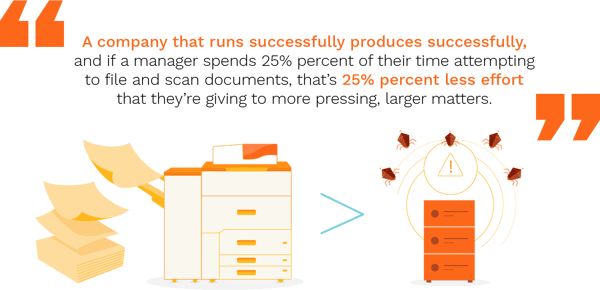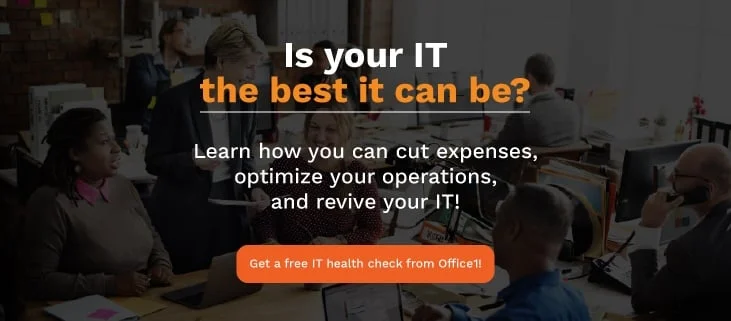The 1980’s were a prolific time of neon, jazzercise, and innovation. One of the greatest innovations, and often least appreciated in today’s heavily digitized age, is electronic document management. The tedious days of monotonous paper filing are over; instead replaced by the convenient and faster method of Electronic Document Management, or Document Management Systems (DMS). Despite the quicker, less erroneous way of filing that DMS offers, businesses today still insist on existing in an almost stone age of filing and organization, needlessly creating microscopic problems within their organization that grows into larger fires. Does this sound familiar? Security breaches, disorganization, loss of PII, all of these issues could potentially be eliminated by an electronic server, yet companies find themselves fighting the shifting tide of document organization. Prejudice against electronic organization is high, notwithstanding the undeniable benefits and reliability of DMS.

So why do companies find themselves resisting this change, what fallacy exists that sway employers and managers away from a less complicated, more efficient system? The short answer is perception, and a damaging one at that. Fears of security violations, unnecessary expense, and dislike of change are all common factors in why businesses pursue a more traditional organizing system, but these fears are not necessarily founded in fact. Every office, no matter the size or caliber, requires a central organization system. In an age where our focus should be on growth and profit, managers shouldn’t be finding themselves solving smaller level problems that realistically could be prevented with the click of a mouse. The old adage, “work smarter, not harder,” comes to mind as we explore digital organization, and the mentality that’s preventing companies from elevating their central organization system to the next level.
“This is Working Just Fine.”
Never in business should we settle for mediocrity, yet when it comes to organization many companies find themselves using systems that first developed in the 19th century. Humans are creatures of habit, and we all value what’s comfortable to us. Unfortunately, businesses don’t grow living in their comfort zone, and managers don’t get recognition or actively problem solve by living in their comfort zone. While there is little risk associated with DMS, the strangeness of a new system coupled with the perceived success of an old, out-dated one, can sway office managers from adapting to the digital age. The saying, “this is working just fine, why should I change?” is not only harmful, but will keep a company in the dark ages, and ultimately leave it behind. A company’s organizational system isn’t comparable to a baby boomer resisting the push for a smartphone, and fear of change, whether it be generational or not, is a loss for a company and a gain for its competitors.
While paper and pen printing and copying, might get the job done, in this day and age that simply isn’t enough. It isn’t enough to inquire, ‘Did the job get done?’ and ‘Did I make the company money?’ These questions are dangerous and set the bar too low. Instead the question should be, ‘Did the job get done as well as possible,’ and ‘Did I make the company as much money as possible?’ DMS allows workers to focus less on stapling, printing, filing, and searching, the busy work is done quickly and digitally, giving workers more time to fight larger fires relevant to their positions. It’s not enough for something to work, it needs to work better than all other options for a company.
One of the biggest dangers of this saying is the unwillingness to change, something that simply cannot exist in a successful business. Every day the world gets a little more advanced, and a little more complicated. A business must adapt and change to fit their consumers needs and wants, but that isn’t just with product.

The cliche, “Don’t fix it if it’s not broken,” is often cited when referencing a resistance to change in business, but it couldn’t be more wrong and actually encourages this reactive mentality. Businesses that are reactive are too late, and businesses that are proactive are on time. Time is one of the most important commodities we have, to spend it hand-filing for hours instead of with the click of a mouse is equivalent to setting company dollars on fire. Managers must constantly be searching for improvements.
“My Company is too Small for Cloud-Based Document Management.”
Companies and businesses exist in a range of sizes, with managers auditing and administering anywhere from a few to hundreds of employees. The size of a business should not be a considering factor when establishing a digital organization system, yet management find themselves pit falling into the fallacy that their company would be fine without DMS. Whether that be due to client size or employee size, it seems natural to build a system based off the existing size of a company. However, many mistaken beliefs seem logical at first glance. A company shouldn’t base it’s organizing system off it’s size because size isn’t a consistent factor over time. Hiring, firing, obtaining new clients, losing clients, economic recession, location; there are a million factors that can ultimately shrink or grow a company drastically. While all of these must be considered for various reasons, managers shouldn’t use a company’s size to determine it’s organizational system. Should the company grow exponentially, and be using a filing cabinet to organize data, it would find itself unable to keep up with the demand of the growth. Not only would their system now be outdated, managers would have no choice but to re-adapt their employees to a new system, utilizing time and resources in the process.

Every company starts small, and because of this size, is an unrealistic factor when considering DMS for a business. Growth should always be the goal. When companies grow, data storage must grow with it.
“Cloud Storage Isn’t Secure.”
As more and more companies shift to the digital age, digital crime and security have heightened greatly. This has caused reasonable fear and distrust in electronic organization systems. However, many people hear of the dangers of electronic organization and stop there. There is little to no acknowledgement of the proactive and secure ways that cloud storage can prevent data and PII leaks. Fortunately, there are many options available to managers to prevent this. Instead of trying to file, and search tediously.
For example, if employees are constantly sending emails back and forth with attachments of sensitive information, they are creating windows of opportunity in your security network for hackers to intercept the transfer. Storing this kind of data in the cloud instead, where it is accessible solely to the employees to whom it should concern, bypasses that potential for risk. Best practice security procedures for e-documents include regular document backup and off-site storage (to guard against having your business’ data wiped out by natural disasters). Cloud-based systems take care of that for you, automatically managing a routine backup schedule and security check.

If your business has multiple employees or partners that share the same computer network, another layer of security you can take is restricting some users’ access so only the most important users are able to see all of the network’s resources. You can also opt to encrypt certain documents so they are only visible to those with the passkey. Cloud storage reduces the risk of your, or your client’s, information falling into the wrong hands, or being entirely destroyed due to a natural disaster.
Despite the pressing insistence that cloud storage isn’t secure, workers have an opportunity to see past this mistaken belief and adapt to the digital era. This will give them more control, and opportunity to focus on more pressing matters than administrative organization within a company.
Categories: Office Automation, Document Management











